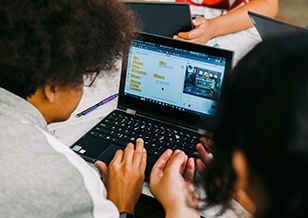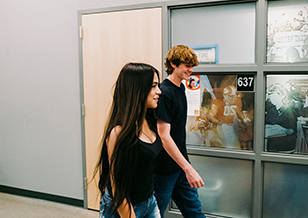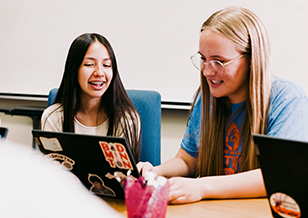3-5 Lenses on the Future Lessons - Unit 1
Using the Self, Security, and Society lenses, students learn more about their interests and strengths, explore how they can use those to contribute to society, and chart a path to future career success. This version of the curriculum is printable.
Lenses on the Future Lessons Unit Overview Blueprint: Grades 3-5
This resource is free to use, adapt, and share for non-commercial purposes with credit to Center for the Future of Arizona. Please review and follow our full Terms of Use.
In this lesson, Young Professionals (YPs) explore their place in the world through the lens of the communities of which they are a part. After developing a definition of community, they reflect on the concepts of responsibilities and obligations by thinking about their own Universe of Obligation and using it to analyze the ways that our culture designates who is deserving of respect and caring.
NOTE: If you use Google Classroom or another LMS that does not support SCORM, please access the digital lesson for the students through the link provided directly here: https://rise.articulate.com/share/i3iuk-_UprK4yro6dodUkNje6L28Jdf3
This resource is free to use, adapt, and share for non-commercial purposes with credit to Center for the Future of Arizona. Please review and follow our full Terms of Use.
Everything we need and want in our lives costs energy in the form of money, time, or both. In this lesson, Young Professionals (YPs) consider the things humans really need to survive—to stay alive. Then, they examine the things they want, their reasons for wanting them, and the energy costs of obtaining them—in terms of both time and money. They consider the cost of a toy in terms of how long it would take an adult to work to earn the money for that toy at different hourly rates of pay.
NOTE: If you use Google Classroom or another LMS that does not support SCORM, please access the digital lesson for the students through the link provided directly here: https://rise.articulate.com/share/wN0z0g0hHlcpRsLZzqWP6qnIBb2Qou4k
This resource is free to use, adapt, and share for non-commercial purposes with credit to Center for the Future of Arizona. Please review and follow our full Terms of Use.
This lesson provides Young Professionals (YPs) the chance to explore a range of careers in terms of the income the work earns. They also work through an understanding of where the money that is earned goes—how it is spent on needs and wants—and create a general savings account for emergencies and a special vacation savings account goal.
NOTE: If you use Google Classroom or another LMS that does not support SCORM, please access the digital lesson for the students through the link provided directly here: https://rise.articulate.com/share/NlLcNHKdK_8sDoIT0mPJ3b3cyRjT2V_K
This resource is free to use, adapt, and share for non-commercial purposes with credit to Center for the Future of Arizona. Please review and follow our full Terms of Use.
In this lesson, Young Professionals (YPs) explore their place in the world through the lens of the communities of which they are a part. After developing a definition of community, they reflect on the concepts of responsibilities and obligations by thinking about their own Universe of Obligation and using it to analyze the ways that our culture designates who is deserving of respect and caring. YPs will consider the community problems of drought, water allocation cuts, and equal access to water for all and explore careers that they think will make the greatest difference in finding solutions to the problems.
NOTE: If you use Google Classroom or another LMS that does not support SCORM, please access the digital lesson for the students through the link provided directly here: https://rise.articulate.com/share/Wk6TzNERxlTbPWqo0yXr6wkYR9o8KPsw
This resource is free to use, adapt, and share for non-commercial purposes with credit to Center for the Future of Arizona. Please review and follow our full Terms of Use.
This lesson introduces Young Professionals (YPs) to principles of economics by contextualizing them in the food industry and the way the industry operates as a food system.
NOTE: If you use Google Classroom or another LMS that does not support SCORM, please access the digital lesson for the students through the link provided directly here: https://rise.articulate.com/share/2RTt95swWLm-5FgS1AkJ_NaUZGCSFwju
This resource is free to use, adapt, and share for non-commercial purposes with credit to Center for the Future of Arizona. Please review and follow our full Terms of Use.






